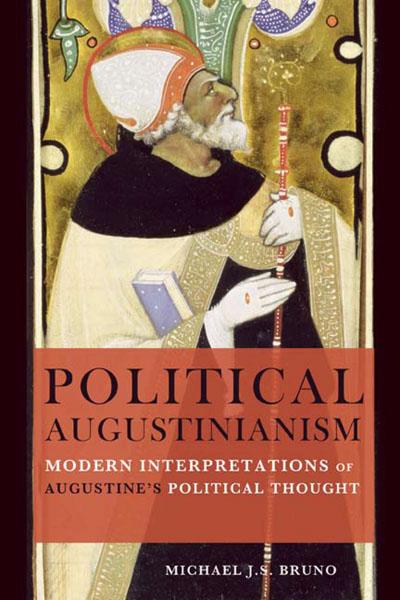Alongside Saint Thomas Aquinas, the thought of Saint Augustine stands as one of the central fountainheads of not only theology but Western social and political theory. In the twentieth century especially, Augustine has been pivotal to the development of modern and contemporary political and social construction. Schools of ‘Augustinianism’ proliferated, especially in French, German, and English, and debated critical questions around the relationship of the church and state, war, justice, ethics, virtue, and the life of citizenship, interpreted through a lens provided by Augustine.
Political Augustinianism examines these modern political readings of Augustine, providing an extensive account of the pivotal French, British, and American strands of interpretation. Fr. Michael J. S. Bruno guides the reader through these modern strands of interpretation, examines their historical, theological, and socio-political context, and discusses the hermeneutical underpinnings of the modern discussion of Augustine’s social and political thought.
Political Augustinianism examines these modern political readings of Augustine, providing an extensive account of the pivotal French, British, and American strands of interpretation. Fr. Michael J. S. Bruno guides the reader through these modern strands of interpretation, examines their historical, theological, and socio-political context, and discusses the hermeneutical underpinnings of the modern discussion of Augustine’s social and political thought.
- Publisher Fortress Press
- Format Paperback
- ISBN 9781451482690
- eBook ISBN 9781451487589
- Dimensions 6 x 9
- Pages 224
- Publication Date September 1, 2014
Contents
Contents:
Introduction
1: French Interpretations of Augustine’s Social and Political Thought
2: From Realism to Justice Ethics: The Early American Reception of the “Political Augustinian” Discussion
3: Disputing the Saeculum: Robert Markus, John Milbank, and Contemporary Augustinian Interpretations
4: Recovering Augustine’s Vision of Public Life and Virtue: The Debate Entering the 21st Century
5: Interpreting Augustine’s Political and Social Thought: Hermeneutical Issues and Contemporary Applications
Conclusion
Bibliography
Introduction
1: French Interpretations of Augustine’s Social and Political Thought
2: From Realism to Justice Ethics: The Early American Reception of the “Political Augustinian” Discussion
3: Disputing the Saeculum: Robert Markus, John Milbank, and Contemporary Augustinian Interpretations
4: Recovering Augustine’s Vision of Public Life and Virtue: The Debate Entering the 21st Century
5: Interpreting Augustine’s Political and Social Thought: Hermeneutical Issues and Contemporary Applications
Conclusion
Bibliography
Endorsements
"Bruno has written a fascinating and complete analytical survey of interpretations of Augustine’s political ideas proposed over most of the last century. It should be essential reading for all future students of the subject."
—John Rist
The Catholic University of America
"What a gift Michael Bruno has given us! A new generation is turning to Augustine for wisdom about politics, but there is so much to learn: world-class scholars on both sides of the Atlantic have debated the subject for more than a century, asking different questions and drawing different conclusions. Bruno is the first to come to grips with this whole debate, and in doing so he helps launch a new century of Augustine scholarship."
—Peter Busch
Villanova University
“Discussions of (and especially the disagreements about) Augustine’s political thought have enlivened studies of this most influential Latin prelate of late antiquity. What Michael Bruno has done to place rival interpretations alongside each other and in the context of other historical and historiographical developments will be welcomed by veterans as well as by those new to the fields of historical theology and political theology. Bruno’s study is an informed, insightful, and eminently readable report on relatively recent research, which exhibits an admirable command of the man and texts his historians have probed.”
—Peter Iver Kaufman
University of Richmond
"Michael Bruno’s Political Augustinianism is the guidebook we needed to connect the new work on Augustine’s political thought in the United States to its European roots. Here we meet all the key interpreters and appreciate the complex ways that they have applied Augustine’s thought to the tragic and transformative political circumstances of the past century, from pre-war France to post-9/11 North America. Beyond this, Bruno manages to advance his own distinctive view: an Augustinian political virtue ethics for the present day. We need this book—not just as Augustinian scholars, but as Christians endeavoring to live as faithful citizens of two cities."
—Joseph Clair
George Fox University
—John Rist
The Catholic University of America
"What a gift Michael Bruno has given us! A new generation is turning to Augustine for wisdom about politics, but there is so much to learn: world-class scholars on both sides of the Atlantic have debated the subject for more than a century, asking different questions and drawing different conclusions. Bruno is the first to come to grips with this whole debate, and in doing so he helps launch a new century of Augustine scholarship."
—Peter Busch
Villanova University
“Discussions of (and especially the disagreements about) Augustine’s political thought have enlivened studies of this most influential Latin prelate of late antiquity. What Michael Bruno has done to place rival interpretations alongside each other and in the context of other historical and historiographical developments will be welcomed by veterans as well as by those new to the fields of historical theology and political theology. Bruno’s study is an informed, insightful, and eminently readable report on relatively recent research, which exhibits an admirable command of the man and texts his historians have probed.”
—Peter Iver Kaufman
University of Richmond
"Michael Bruno’s Political Augustinianism is the guidebook we needed to connect the new work on Augustine’s political thought in the United States to its European roots. Here we meet all the key interpreters and appreciate the complex ways that they have applied Augustine’s thought to the tragic and transformative political circumstances of the past century, from pre-war France to post-9/11 North America. Beyond this, Bruno manages to advance his own distinctive view: an Augustinian political virtue ethics for the present day. We need this book—not just as Augustinian scholars, but as Christians endeavoring to live as faithful citizens of two cities."
—Joseph Clair
George Fox University
